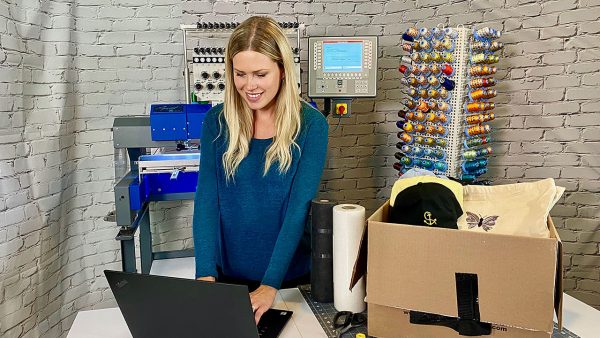Introduction
Embroidering logos or designs on apparel, accessories, or promotional items adds a polished, professional touch that elevates your brand or personal creations. However, turning a digital image into a stitch-ready file requires specialized skills to ensure the design looks crisp and stitches smoothly. While DIY tools exist, they often fall short for complex designs or high-volume needs. Hiring professional embroidery digitizers guarantees high-quality files tailored to your machine and fabric, saving time and delivering stunning results. In this guide, we’ll explore why you should hire professional embroidery digitizers and how they can transform your embroidery projects with precision and ease.
What Do Professional Embroidery Digitizers Do?
Professional embroidery digitizers convert digital images, like JPGs, PNGs, or vector files, into embroidery files (e.g., DST, PES, VP3, EXP) that instruct machines on stitch patterns, thread colors, and sequences. Unlike automated software, they use expertise to optimize files for specific machines, fabrics, and design complexities. They adjust stitch density, underlay, and types (satin for outlines, fill for solid areas) to prevent issues like puckering or thread breaks. This tailored approach ensures your designs look professional, whether for branding, gifts, or custom projects.
Why Hire Professional Digitizers?
Hiring professional digitizers offers distinct advantages for achieving quality embroidery results. Here’s why they’re essential:
Unmatched Quality and Precision
Professional digitizers bring years of experience, ensuring your designs stitch cleanly with sharp details and vibrant colors. They meticulously trace logos or artwork, assign appropriate stitch types, and optimize settings to preserve intricate elements. This precision delivers a polished look that reflects quality, unlike automated tools that may produce distorted or incomplete stitches, making them ideal for professional branding or detailed projects.
Consistency Across Multiple Items
Whether you’re embroidering logos on shirts, caps, or bags, professional digitizers ensure uniformity across all items. They tailor files for different fabrics and machines, maintaining consistent color, size, and placement. This consistency is crucial for branding, as it builds recognition and trust, ensuring your logo looks the same on every product, from employee uniforms to promotional giveaways.
Time and Cost Efficiency
DIY digitizing can be time-consuming and error-prone, leading to wasted materials and frustration. Professional digitizers deliver ready-to-stitch files quickly, often within 24–48 hours, saving you hours of trial and error. Their expertise minimizes costly mistakes like fabric damage or thread breaks, making them a cost-effective choice for businesses scaling production or hobbyists with tight deadlines.
Versatility for Any Machine or Fabric
Professional digitizers create files compatible with all major embroidery machines, like Brother, Bernina, Pfaff, or Husqvarna Viking, giving you flexibility to work with multiple machines or suppliers. They also optimize designs for various fabrics, from stretchy knits to thick denim, ensuring flawless results on any material. This versatility is perfect for diverse projects, from uniforms to custom gifts.
Creative Flexibility for Complex Designs
Complex logos or intricate artwork can be challenging to digitize. Professionals handle these with ease, offering consultations to refine your vision and ensure the design translates well to embroidery. They can simplify details without losing impact, allowing you to create standout designs that align with your brand or creative goals.
How to Hire Professional Embroidery Digitizers
Finding the right digitizer is key to quality results. Here are the top methods to hire professionals:
Method 1: Use Online Digitizing Services
Online platforms like MySewnet or DigitizingUSA connect you with expert digitizers who deliver high-quality files tailored to your needs.
Steps to Hire an Online Service
- Choose a Reputable Provider: Select a service with strong reviews and a portfolio showcasing quality work, such as MySewnet or DigitizingUSA.
- Upload Your Design: Submit your JPG, PNG, or vector file via the provider’s website or email.
- Specify Requirements: Indicate your machine type (e.g., Brother, Pfaff), file format (DST, PES, VP3), fabric, and project details.
- Receive the File: The digitizer will email the file, typically within 24–48 hours.
- Test the File: Stitch it on scrap fabric to ensure it meets your quality standards.
Online services are convenient and efficient for businesses and hobbyists.
Method 2: Hire Freelance Digitizers on Etsy
Etsy hosts skilled freelance digitizers offering personalized services at competitive rates, ideal for custom or unique projects.
Steps to Hire a Freelancer
- Search for Digitizers: Browse Etsy for digitizers specializing in embroidery files, checking ratings and portfolios.
- Contact the Seller: Message the digitizer with your design and project details, including machine type and fabric.
- Provide Specifications: Share your vision, such as color preferences or item types (e.g., shirts, caps).
- Receive and Test: Get the digitized file via email and test it on your machine to confirm quality.
Freelancers provide a personal touch, perfect for tailored designs.
Method 3: Work with Local Digitizing Companies
Local companies offer hands-on service, often with consultations to ensure your designs align with your goals.
Steps to Work with a Local Company
- Find a Local Provider: Search for digitizing companies in your area via Google or local directories.
- Submit Your Design: Email or visit the company to provide your artwork and discuss your project.
- Discuss Details: Specify your machine, fabric, and design goals for optimized files.
- Receive the File: Get the digitized file, often with faster turnaround for local clients.
- Test the Design: Embroider a sample to verify quality and compatibility.
Local companies offer reliable communication and quick delivery.
Tips for Working with Professional Digitizers
To get the best results from professional digitizers, follow these tips:
- Provide High-Resolution Images: Use designs with at least 300 DPI to ensure clear, detailed stitches.
- Simplify Complex Designs: Reduce colors and remove fine details that don’t translate well to embroidery.
- Specify Brand Colors: Share your color palette or use thread charts (e.g., Madeira, Isacord) for accurate matching.
- Test on Target Fabrics: Stitch samples on your project materials (e.g., cotton, denim) to check for issues.
- Communicate Clearly: Provide detailed instructions on placement, size, and fabric to align with your vision.
These practices ensure your digitized files meet high standards.
Common Challenges and Solutions
Working with professional digitizers can present challenges, but they’re manageable:
- Cost Concerns: Professional services may seem expensive. Compare prices or request bulk discounts for multiple designs.
- Complex Designs: Intricate artwork may not stitch well. Collaborate with the digitizer to simplify while retaining key elements.
- File Compatibility: Ensure the file format matches your machine (e.g., PES for Brother, VP3 for Pfaff).
- Turnaround Time: Tight deadlines may require rush services. Confirm delivery timelines upfront.
Clear communication and testing resolve most issues.
Tools to Complement Professional Digitizing
Enhance your workflow with these tools:
- Image Editing Software: Use GIMP or Canva to prepare designs before sending them to digitizers.
- USB Drives: Transfer files to your embroidery machine with a compatible USB stick.
- Stabilizers: Use cut-away for stretchy fabrics or tear-away for woven materials to support stitching.
- Design Guidelines: Share a style guide with the digitizer to ensure consistency.
These tools streamline collaboration and improve results.
When to Hire Professional Digitizers
Hiring professionals is ideal for complex designs, tight deadlines, or when you need files for multiple machines. They’re also perfect for beginners lacking digitizing skills or businesses scaling production. Services like MySewnet, Etsy digitizers, or local companies deliver high-quality files tailored to your needs, often within 24 hours. Choose providers with strong portfolios, confirm they support your machine’s format, and read reviews for reliability.
Conclusion
Hiring professional embroidery digitizers ensures your designs look stunning, consistent, and professional on any fabric or item. Their expertise saves time, reduces errors, and delivers versatile files for all major machines. Whether you choose online platforms, freelance digitizers, or local companies, clear communication and testing lead to flawless embroidery. Start with high-resolution designs, specify your needs, and collaborate with professionals to create embroidery that elevates your projects. Invest in professional embroidery digitizers today and achieve quality results that make your brand or creations shine.

